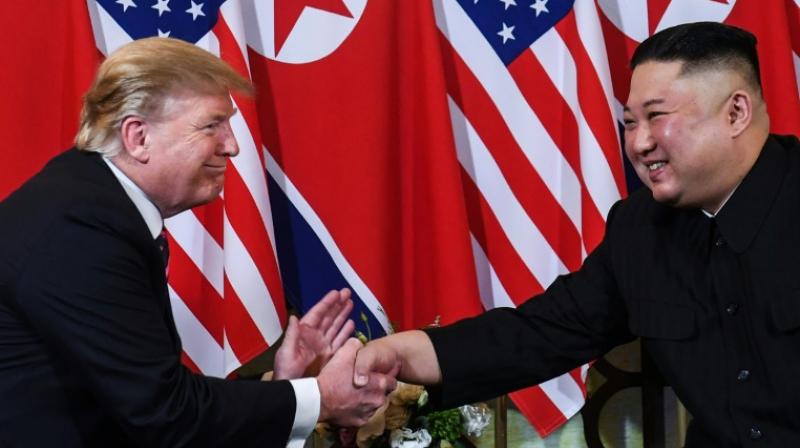Trump invites Kim to ‘say hello’; heads for demilitarised zone

Seoul: US President Donald Trump heads for the Demilitarised Zone dividing the two Koreas on Sunday and a possible impromptu summit with North Korean leader Kim Jong Un, in what would be a remarkable diplomatic spectacle.
Kim "very much wants" to meet, Trump said on Sunday after he turned to Twitter to invite him to a third diplomatic date after their first two encounters in Singapore and Hanoi.
"Let's see what happens," the US President told business leaders in Seoul."We are trying to work it out. It will be very short but that's OK. A handshake means a lot."
Their first meeting last year took place in a blaze of publicity, the first-ever encounter between a leader of the nuclear-armed North and a sitting US president, whose forces and their allies fought each other to a stalemate in the 1950-53 Korean War.
That summit produced a vaguely-worded pledge about denuclearisation, but a second meeting in Vietnam in February intended to put flesh on those bones broke up without agreement.
Contact between the two sides has since been minimal -- with Pyongyang issuing frequent criticisms of the US position -- but the two leaders have exchanged a series of letters.
"If Chairman Kim of North Korea sees this, I would meet him at the Border/DMZ just to shake his hand and say Hello(?)!," Trump tweeted on Saturday from Osaka in Japan, where he was attending a G20 summit before flying to Seoul.
He later said he would have "no problem" stepping into the North with Kim -- in what would be a dramatic re-enactment of the extraordinary scene last year when the young leader invited South Korean President Moon Jae-in to walk over the Military Demarcation Line that divides the Koreas.
"Sure I would, I would. I'd feel very comfortable doing that. I'd have no problem," Trump told reporters.
It was still not clear on Sunday morning whether Kim would attend the rendezvous.
In an unusually fast and public response, within hours of Trump's tweet the North's official KCNA news agency quoted Vice Foreign Minister Choe Son Hui as saying the offer was "a very interesting suggestion" but that no official request had been received.
'Barren no-man's land'
A meeting in the DMZ would make a powerful visual statement, but analysts were divided over its potential impact.
The four-kilometre-wide (2.5 miles) zone, running for 250 kilometres, is where the front line lay when the Korean War ended with a ceasefire rather than a peace treaty, and is described as the world's last Cold War frontier.
John Delury of Yonsei University in Seoul said a meeting in the "barren no man's land that embodies the unhealed wound of post-WWII division, the Korean War, and 70 years of animosity" would help improve ties.
"It's not just about denuclearisation and it's not all about a deal -- important as those are," he said. "If Trump and Kim meet & can announce some kind of interim agreement, that's great. If they meet and don't, that's ok too. If in the end they don't meet, it's good that Trump offered to."
However, Robert Kelly of Pusan National University derided Trump's invitation as "emblematic of why the Trump NK effort is a farce: thrown-together; last-minute; made-for-TV".
It was driven by the US president's "lust for optics and drama rather than substance" and "a photo-op for the 2020 election", he tweeted.
'Historic setting'
The DMZ has been a regular stop for US presidents visiting the South, a security ally -- although Trump's helicopter was forced to turn back by fog in 2017.
And Moon – who will also be going to the DMZ on Sunday, Trump said – and Kim held their first two summits last year at Panmunjom, a "truce village" on the border.
The Hanoi meeting between Trump and Kim foundered amid disagreements on what the North – which has carried out five nuclear tests and developed missiles capable of reaching the entire US mainland – would be willing to give up in exchange for relief from sanctions that have crippled its economy.
Trump could leverage the "historic setting" to send a clear message to Pyongyang on what a compromise agreement might look like, said Harry Kazianis of the Center for the National Interest.
The US could offer to suspend, rather than remove, some of the UN Security Council sanctions in exchange for the full closure of the North's Yongbyon nuclear facility, he suggested.
"Such a formulation would give Pyongyang the economic incentives it needs to jump-start its economy while giving Trump an important foreign policy victory."

